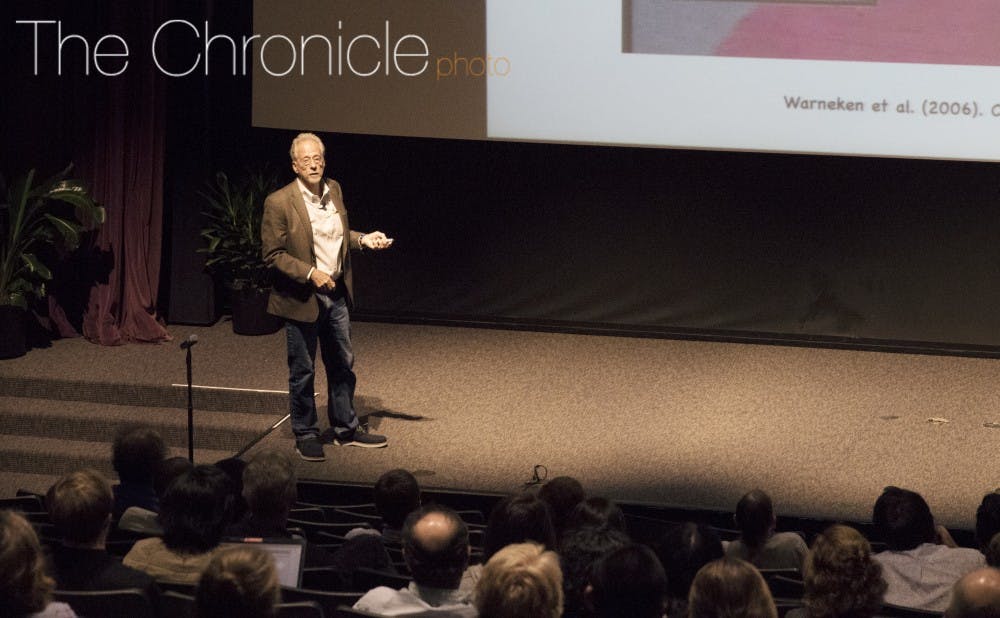Scientists have long searched for what distinguishes humans from animals, but are we close to an answer?
Michael Tomasello, James Bonk Professor of Psychology and Neuroscience and Trinity '72, shed light on his findings regarding human uniqueness during a lecture Thursday. Recently elected to the National Academy of the Sciences, he has spent close to 25 years comparing human and great ape behavior, with an emphasis on how children behave at different developmental stages.
“This is not a difference of general intelligence,” Tomasello said. “It is not just the case that humans are smarter than apes across the board. It’s specifically social at two-and-a-half years old.”
He hypothesized that the main difference occurs as a result of a “uniquely human psychology," which is rooted in our social norms.
Tomasello—who is also a co-director for the Max Planck Institute for Evolutionary Anthropology in Germany—explained that his insights into human uniqueness are based on several experiments.
In one major experiment, he and his team designed an apparatus out of a board with a rope attached to either end and food items such as bananas and gummies in the center. Study participants were required to work with each other to pull the rope so that they could bring the board with the food closer.
Testing the apparatus with both young apes and human children, his team found that the humans were more likely to collaborate and share the food reward, while apes would collaborate no more than once.
Tomasello explained that his experiments shed light on how apes have a mindset of "individual intentionality" and will often not share food rewards obtained during simulated tasks because they look to serve their own benefit.
Humans on the other hand have a sense of “shared intentionality,” often considering the effects of their actions upon an entire group, he said. This shared intentionality allows for continual collaboration with peers.
“If a strategy is going to be evolutionarily stable, everybody has to be satisfied with the end point,” Tomasello said. “We [humans] have to share the spoils at the end in a way that everybody’s happy.”
Human children have also been observed to voluntarily give up some of their own food rewards to ensure that everyone who helped receives a fair share. Tomasello said his research demonstrated that three-year-old children would do so 80 percent of the time while collaborating. When not required to exert themselves, however, the children would sacrifice their own earnings only 11 percent of the time.
Several members of the audience noted that they found Tomasello's lecture and research to be insightful.
First-year Rishika Gundi said that she was particularly engaged with Tomasello's thoughts on how human uniqueness stems from the ability to work together.
“I think all these experiments look really easy in retrospect,” said sophomore Annika Sharma, who became interested in Tomasello's work during her Writing 101 course. “But to actually come up with them at the time at which there was no background on which to base them is amazing.”
Tomasello's lecture follows his election to the National Academy of Sciences in May, considered to be one of the most prestigious awards a scientist can receive.
Maggie Crumbo, staff assistant in the Office of the Vice Provost for Research, wrote in an email that his lecture was a celebration of this particular achievement as well as the legacy of his research.
“He’s somebody who is a genius,” said Brian Hare, associate professor of evolutionary anthropology. “But he does not fit any definition that anyone would normally recognize as a genius. Probably his genius is the thesis of his hypothesis about human genius. He can get people to collaborate like no one else I’ve ever known.”
Get The Chronicle straight to your inbox
Signup for our weekly newsletter. Cancel at any time.

